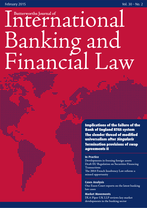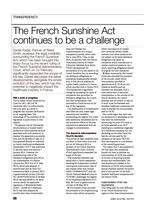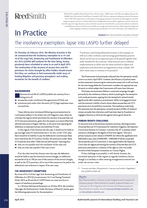Description
IN PRACTICE
In Practice
Reed Smith is a global relationship law ï¬rm, with more than 1,800 lawyers in 25 offices throughout Europe, the
Middle East, Asia and the United States. Founded in 1877, the ï¬rm represents leading international businesses
from FTSE 100 corporations to mid-market and emerging enterprises. Its lawyers provide litigation and other
dispute resolution services in multi-jurisdictional and high-stake matters, deliver regulatory counsel, and execute
the full range of strategic domestic and cross-border transactions. Reed Smith is a preeminent advisor to industries
including ï¬nancial services, life sciences, health care, energy and natural resources, advertising, technology and
media, shipping, real estate, manufacturing, and education.
For more information, visit reedsmith.com. Authors Ben Summerï¬eld and Joshua Kendal The insolvency exemption: lapse into LASPO further delayed On Thursday 26 February 2015, the Ministry of Justice in the UK announced that the insolvency exemption to ss 44 and 46 of the Legal Aid, Sentencing and Punishment of Offenders Act 2012 (LASPO) will continue for the time being, having previously been scheduled to come to an end in April 2015. The continuation of the recovery of success fees and ATE premiums for claims brought by ofï¬ce holders should ensure that they can continue to ï¬nd economically viable ways of funding litigation and pursuing wrongdoers and making recoveries for the beneï¬t of creditors. BACKGROUND â– Sections 44 and 46 of LASPO prohibit the recovery from a losing party of: success fees under conditional fee agreements (CFAs); and premiums paid under after the event (ATE) legal expenses insurance policies. These reforms were introduced following recommendations by Lord Justice Jackson in his review into civil litigation costs, where he criticised the regime which permitted the recovery of success fees and ATE insurance premiums, given that the system as it stood effectively allowed claimants to litigate risk-free, at the same time exposing the defendant to disproportionate cost liabilities if it lost. In this regard, if the claimant lost the case, it would not be liable to pay any legal costs if it had entered into a “no win, no fee” CFA, plus there would be no liability to pay the defendant’s costs because these were covered by the ATE policy. Further, the premiums under these ATE policies were often “deferred and self-insured” meaning that: they are not payable until the conclusion of the case; and they are only ever payable if the case is won. If on the other hand the claimant won the case, the defendant would be liable to pay the claimant’s normal charges, an additional success fee of up to 100 per cent of the amount of the normal charges, as well as the ATE premium, all on top of the amounts to be paid to the defendant’s own solicitors in respect of its own costs. “Insolvency cases bring substantial revenue to the taxpayer, as well as to other creditors, and encourage good business practice which can be seen as an important part of the growth agenda with wider beneï¬ts for the economy. These features merit a delayed implementation to allow time for those involved to adjust and implement such alternative arrangements as they consider will allow these cases to continue to be pursued.” The Government had previously indicated that the exemption would come to an end in April 2015.
However, the Ministry of Justice’s latest written statement announcing its continuation states that it will continue for the time being whilst the Government considers the appropriate way forward, on which subject the Government will revert later this year. This latest announcement follows a continued campaign brought primarily by the insolvency industry, which is pushing for the exemption to be made permanent, arguing that the exemption’s removal would signiï¬cantly affect insolvency practitioners’ ability to bring good claims and the economic viability of such claims where success fees and ATE premiums are to be paid from recoveries. The insolvency trade body, R3, estimates that the exemption currently protects £160m of creditors’ money annually that otherwise could have been kept by fraudulent or negligent directors or third parties against whom good claims lie. HUMAN RIGHTS CHALLENGE At the same time as the previous measures continue, allowing recovery of success fees and ATE premiums for insolvency litigation, the Supreme Court’s ï¬nal decision in Coventry v Lawrence (No 2)1 is awaited, which concerns a challenge to the legality of that very regime. This was a private nuisance action valued at £74,000, but where the appellants were held liable to pay costs of £640,000 – £400,000 of which comprised the success fee and ATE premium.
It was argued before the Supreme Court that the regime permitting the recovery of success fees and ATE premiums amounted to a violation of the right to a fair trial under Article 6 of the European Convention on Human Rights. If that challenge is successful, it will clearly threaten the continued operation of the regime as regards insolvency claims, though it is unlikely to affect existing arrangements entered into under the current rules. 1 THE INSOLVENCY EXEMPTION By virtue of Art 4 of the Legal Aid, Sentencing and Punishment of Offenders Act 2012 (Commencement No 5 and Saving Provision) Order 2013, ss 44 and 46 of LASPO have not come into force in respect of insolvency proceedings. In a Written Ministerial Statement on 24 May 2012, Mr Jonathan Djanogly, the Parliamentary Under-Secretary of State for Justice, gave the following explanation for this exemption: 234 April 2015 Coventry and others (Respondents) v Lawrence and another (Appellants) (No 2) [2014] UKSC 46. Biog box Ben Summerï¬eld is a Partner in the Litigation and Commercial Disputes group at Reed Smith in London. Joshua Kendal is an Associate in the Litigation and Commercial Disputes group at Reed Smith in London. Email: bsummerï¬eld@reedsmith.com and jkendal@reedsmith.com Butterworths Journal of International Banking and Financial Law .
For more information, visit reedsmith.com. Authors Ben Summerï¬eld and Joshua Kendal The insolvency exemption: lapse into LASPO further delayed On Thursday 26 February 2015, the Ministry of Justice in the UK announced that the insolvency exemption to ss 44 and 46 of the Legal Aid, Sentencing and Punishment of Offenders Act 2012 (LASPO) will continue for the time being, having previously been scheduled to come to an end in April 2015. The continuation of the recovery of success fees and ATE premiums for claims brought by ofï¬ce holders should ensure that they can continue to ï¬nd economically viable ways of funding litigation and pursuing wrongdoers and making recoveries for the beneï¬t of creditors. BACKGROUND â– Sections 44 and 46 of LASPO prohibit the recovery from a losing party of: success fees under conditional fee agreements (CFAs); and premiums paid under after the event (ATE) legal expenses insurance policies. These reforms were introduced following recommendations by Lord Justice Jackson in his review into civil litigation costs, where he criticised the regime which permitted the recovery of success fees and ATE insurance premiums, given that the system as it stood effectively allowed claimants to litigate risk-free, at the same time exposing the defendant to disproportionate cost liabilities if it lost. In this regard, if the claimant lost the case, it would not be liable to pay any legal costs if it had entered into a “no win, no fee” CFA, plus there would be no liability to pay the defendant’s costs because these were covered by the ATE policy. Further, the premiums under these ATE policies were often “deferred and self-insured” meaning that: they are not payable until the conclusion of the case; and they are only ever payable if the case is won. If on the other hand the claimant won the case, the defendant would be liable to pay the claimant’s normal charges, an additional success fee of up to 100 per cent of the amount of the normal charges, as well as the ATE premium, all on top of the amounts to be paid to the defendant’s own solicitors in respect of its own costs. “Insolvency cases bring substantial revenue to the taxpayer, as well as to other creditors, and encourage good business practice which can be seen as an important part of the growth agenda with wider beneï¬ts for the economy. These features merit a delayed implementation to allow time for those involved to adjust and implement such alternative arrangements as they consider will allow these cases to continue to be pursued.” The Government had previously indicated that the exemption would come to an end in April 2015.
However, the Ministry of Justice’s latest written statement announcing its continuation states that it will continue for the time being whilst the Government considers the appropriate way forward, on which subject the Government will revert later this year. This latest announcement follows a continued campaign brought primarily by the insolvency industry, which is pushing for the exemption to be made permanent, arguing that the exemption’s removal would signiï¬cantly affect insolvency practitioners’ ability to bring good claims and the economic viability of such claims where success fees and ATE premiums are to be paid from recoveries. The insolvency trade body, R3, estimates that the exemption currently protects £160m of creditors’ money annually that otherwise could have been kept by fraudulent or negligent directors or third parties against whom good claims lie. HUMAN RIGHTS CHALLENGE At the same time as the previous measures continue, allowing recovery of success fees and ATE premiums for insolvency litigation, the Supreme Court’s ï¬nal decision in Coventry v Lawrence (No 2)1 is awaited, which concerns a challenge to the legality of that very regime. This was a private nuisance action valued at £74,000, but where the appellants were held liable to pay costs of £640,000 – £400,000 of which comprised the success fee and ATE premium.
It was argued before the Supreme Court that the regime permitting the recovery of success fees and ATE premiums amounted to a violation of the right to a fair trial under Article 6 of the European Convention on Human Rights. If that challenge is successful, it will clearly threaten the continued operation of the regime as regards insolvency claims, though it is unlikely to affect existing arrangements entered into under the current rules. 1 THE INSOLVENCY EXEMPTION By virtue of Art 4 of the Legal Aid, Sentencing and Punishment of Offenders Act 2012 (Commencement No 5 and Saving Provision) Order 2013, ss 44 and 46 of LASPO have not come into force in respect of insolvency proceedings. In a Written Ministerial Statement on 24 May 2012, Mr Jonathan Djanogly, the Parliamentary Under-Secretary of State for Justice, gave the following explanation for this exemption: 234 April 2015 Coventry and others (Respondents) v Lawrence and another (Appellants) (No 2) [2014] UKSC 46. Biog box Ben Summerï¬eld is a Partner in the Litigation and Commercial Disputes group at Reed Smith in London. Joshua Kendal is an Associate in the Litigation and Commercial Disputes group at Reed Smith in London. Email: bsummerï¬eld@reedsmith.com and jkendal@reedsmith.com Butterworths Journal of International Banking and Financial Law .













